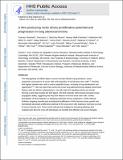A Wnt-producing niche drives proliferative potential and progression in lung adenocarcinoma
Author(s)
Katajisto, Pekka; Tammela, Tuomas; Cetinbas, Naniye; Wu, Katherine; Helenius, Katja Piritta; Park, Yoona K; Azimi, Roxana S.; Kerper, Natanya R.; Wesselhoeft IV, Robert Alexander; Gu, Xin; Schmidt, Leah Marie; Cornwall-Brady, Milton R.; Yilmaz, Omer; Xue, Wen; Bhutkar, Arjun; Jacks, Tyler E; Sanchez-Rivera, Francisco Jav; Joshi, Nik; ... Show more Show less
Downloadnihms865773.pdf (2.343Mb)
PUBLISHER_POLICY
Publisher Policy
Article is made available in accordance with the publisher's policy and may be subject to US copyright law. Please refer to the publisher's site for terms of use.
Terms of use
Metadata
Show full item recordAbstract
The heterogeneity of cellular states in cancer has been linked to drug resistance, cancer progression and the presence of cancer cells with properties of normal tissue stem cells. Secreted Wnt signals maintain stem cells in various epithelial tissues, including in lung development and regeneration. Here we show that mouse and human lung adenocarcinomas display hierarchical features with two distinct subpopulations, one with high Wnt signalling activity and another forming a niche that provides the Wnt ligand. The Wnt responder cells showed increased tumour propagation ability, suggesting that these cells have features of normal tissue stem cells. Genetic perturbation of Wnt production or signalling suppressed tumour progression. Small-molecule inhibitors targeting essential posttranslational modification of Wnt reduced tumour growth and markedly decreased the proliferative potential of lung cancer cells, leading to improved survival of tumour-bearing mice. These results indicate that strategies for disrupting pathways that maintain stem-like and niche cell phenotypes can translate into effective anti-cancer therapies.
Date issued
2017-05Department
Koch Institute for Integrative Cancer Research at MITJournal
Nature
Publisher
Nature Publishing Group
Citation
Tammela, Tuomas et al. “A Wnt-Producing Niche Drives Proliferative Potential and Progression in Lung Adenocarcinoma.” Nature 545, 7654 (May 2017): 355–359 © 2017 Macmillan Publishers Limited, part of Springer Nature
Version: Final published version
ISSN
0028-0836
1476-4687